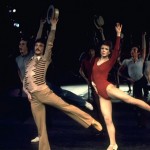At an audition, 18 dancers vie for eight openings in the chorus line of an upcoming musical. The director invites them to step forward, one by one, and tell him something true about themselves. And they do.
That’s the simple conceit behind A Chorus Line, a show “dedicated to anyone who has ever danced in a chorus or marched in step … anywhere.” As director Michael Bennett noted, “There is truth on that stage — nothing monumental or astounding, but truth nonetheless.”
The musical was formed from several taped sessions with Broadway dancers that Tony Stevens and Michon Peacock helped Bennett organize. The first session was on a snowy Saturday in January 1974 at the Nickolaus Exercise Center on the East Side of Manhattan. Bennett started the evening by describing his idea for a show called A Chorus Line.
“I really want to talk about us, where we came from, why we’re dancers, what the alternatives are, why we think we’re in this business,” he said. “I don’t know whether anything will come of this. … We’ll just talk.” Late into the night, the dancers spoke about their lives. In the end, Bennett had accumulated about 30 hours of material.
He listened to those tapes for several months, before the audition idea came to him. He asked Nicholas Dante, one of the dancers who also wrote, to help edit the material into a script, then he arranged for a workshop at the Public Theater and secured Marvin Hamlisch and Edward Kleban to write the score. That spring, Bennett called the dancers to audition for the workshop — and compete against other dancers to play themselves in the show. Not all of them made the cut.
The first workshop in August was almost five hours. There was trimming to do, so Bennett asked playwright James Kirkwood to rework the book for the second workshop in December. After much more tightening, they opened at the Public in May 1975, 16 months after those first all-night talks, starring Kelly Bishop (Sheila), Priscilla Lopez (Diana), Donna McKechnie (Cassie), Sammy Williams (Paul), and Robert LuPone (Zach). Advance word had created such a demand for tickets that the entire Off-Broadway run sold out, so producer Joseph Papp moved the production to Broadway two months later.
The show received 12 Tony Award nominations and won nine, including best musical, book (Kirkwood and Dante), score (Hamlisch and Kleban), direction (Bennett), and choreography (Bennett and Bob Avian). Bishop, McKechnie, and Williams also won Tonys for their performances, while Lopez and Williams won Obies for their work in the Off-Broadway production. The following spring, A Chorus Line became the fifth musical in history to win the Pulitzer Prize for Drama.
After the show moved to Broadway, Bennett’s lawyers drew up an arrangement that divided the performers involved into three groups. As the New York Times reported, Group A were those in the tape sessions or workshops; Group B were those only in the tape sessions; and Group C were those in the show but not in the workshops. In total, Bennett signed over about a tenth of his royalties and a third of his rights income to these performers. (During a rehearsal break for the first workshop, the performers had signed releases that gave Bennett rights to their interview materials in exchange for $1.)
In 1976, the first national tour opened in Los Angeles with many of the original Broadway cast, and the international touring cast premiered the show in London. The West End production won the Laurence Olivier Award as best musical and ran for three years. On September 29, 1983, Bennett and 332 veteran cast members celebrated the musical becoming the longest-running show in Broadway history, a record it held until 1997, when Cats surpassed its 6,137 performances.
The film adaptation premiered in 1985, starring Vicki Frederick (Sheila), Yamil Borges (Diana), Alyson Reed (Cassie), Cameron English (Paul), and Michael Douglas (Zach). Bennett has been slated to direct but bowed out (when the studio rejected his proposal to rework the show as an audition for the film of the stage musical), replaced by Richard Attenborough.
After listening to the original cast album, you can learn more about the creation of the musical in On the Line (1990) by Robert Viagas.
NEXT, for another show that Papp workshopped and Bennett directed, explore Dreamgirls, with music by Henry Krieger and libretto by Tom Eyen. The film soundtrack is worth a listen, but Jennifer Holliday’s Grammy-winning “And I Am Telling You I’m Not Going” makes the Broadway recording my choice.
THEN, listen to a more recent show inspired by real life: Dear Evan Hansen, with book by Steven Levenson and a score by Benj Pasek and Justin Paul.

